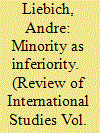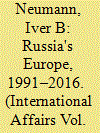| Srl | Item |
| 1 |
ID:
086145


|
|
|
|
|
| Publication |
2008.
|
| Summary/Abstract |
This article argues that minority rights developed as an indemnity offered to defeated parties. As a grudging and begrudged calculus of compensation, considered inadequate by the vanquished and offensive by the victors, minority rights have been unable to compete in terms of legitimacy with either an increasingly robust international human rights regime or with the right of national self-determination. After reviewing some explanations for the weakness of the existing minority rights regime, this article traces the rationale of what may be described anachronistically as minority rights provisions in international treaties from the Peace of Westphalia to the Versailles settlement, concluding with a consideration of present-day implications of the argument elaborated here.
|
|
|
|
|
|
|
|
|
|
|
|
|
|
|
|
| 2 |
ID:
166621


|
|
|
|
|
| Summary/Abstract |
African economies are currently characterised by the increasing penetration of made-in-China products, resulting in a resurgence of academic interest in the ‘country of origin’ (COO) studies. The existing literature has described Chinese products as ‘inferior’ and patronised by the poor who cannot afford ‘superior’ brands from elsewhere. Based on in-depth interviews conducted with 65 consumers and 15 suppliers of made-in-China products in Ghana, this paper unpacks the notion of ‘inferiority’ of ‘made-in-China’ and the process of uptake in Ghana. The findings indicate that increasingly, Ghanaians of different socioeconomic statuses patronise made-in-China and employ various approaches including foot-in-the-door technique, the demand for product warranty and reliance on product reviews to guarantee their purchases. The findings, therefore, challenge the constraining effect of COO as a determinant of purchasing behaviour and reiterate the creativity and innovativeness of consumers to safeguard their private interest.
|
|
|
|
|
|
|
|
|
|
|
|
|
|
|
|
| 3 |
ID:
148468


|
|
|
|
|
| Summary/Abstract |
Russia defines itself as a Great Power in relation to Europe and the West. The first part of the article traces how, since 1991, a story about greatness centred on being part of contemporary European civilization has given way to a story of how Russia is great by being superior to a Europe that is now seen as rotten and decadent. The former story spelled cooperation with Europe and the West, where the latter spells confrontation. The second part argues that Russia's superiority complex is unsustainable. It is hard to see how, in the face of the formative structural pressure of the state system, Russia will be able to sustain its superiority complex. A state that does not order itself in such a way that it may either gain recognition as a Great Power by forcing its way and/or by being emulated by others, is unlikely to maintain that status. The costs of maintaining Great-Power status without radical political and economic change seem to be increasing rapidly. If Russia wants to maintain its status, an about-turn is needed. Such a turn may in itself be no solution, though, for if Russia does not do anything about the root causes of its perceived inferiority to Europe, then the Russian cyclical shifting from a Westernizing to a xenophobic stance will not be broken.
|
|
|
|
|
|
|
|
|
|
|
|
|
|
|
|